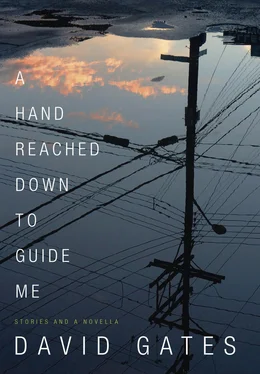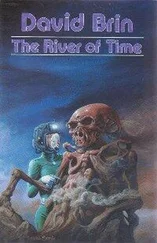David Gates - A Hand Reached Down to Guide Me
Здесь есть возможность читать онлайн «David Gates - A Hand Reached Down to Guide Me» весь текст электронной книги совершенно бесплатно (целиком полную версию без сокращений). В некоторых случаях можно слушать аудио, скачать через торрент в формате fb2 и присутствует краткое содержание. Жанр: Современная проза, на английском языке. Описание произведения, (предисловие) а так же отзывы посетителей доступны на портале библиотеки ЛибКат.
- Название:A Hand Reached Down to Guide Me
- Автор:
- Жанр:
- Год:неизвестен
- ISBN:нет данных
- Рейтинг книги:5 / 5. Голосов: 1
-
Избранное:Добавить в избранное
- Отзывы:
-
Ваша оценка:
- 100
- 1
- 2
- 3
- 4
- 5
A Hand Reached Down to Guide Me: краткое содержание, описание и аннотация
Предлагаем к чтению аннотацию, описание, краткое содержание или предисловие (зависит от того, что написал сам автор книги «A Hand Reached Down to Guide Me»). Если вы не нашли необходимую информацию о книге — напишите в комментариях, мы постараемся отыскать её.
magazine anointed “a true heir to both Raymond Carver and John Cheever.”
A Hand Reached Down to Guide Me Relentlessly inventive, alternately hilarious and tragic, always moving, this book proves yet again that Gates is one of our most talented, witty and emotionally intelligent writers.
A Hand Reached Down to Guide Me — читать онлайн бесплатно полную книгу (весь текст) целиком
Ниже представлен текст книги, разбитый по страницам. Система сохранения места последней прочитанной страницы, позволяет с удобством читать онлайн бесплатно книгу «A Hand Reached Down to Guide Me», без необходимости каждый раз заново искать на чём Вы остановились. Поставьте закладку, и сможете в любой момент перейти на страницу, на которой закончили чтение.
Интервал:
Закладка:
Kenny Donnelly was at Circle in the Square at the same time as me, and he always tried to throw work my way. You might have called him a friend too. Last spring I was picking up extra money doing radio commercials while he was finishing a five-month run at Cherry Lane with his adaptation of The London Merchant; or, the History of George Barnwell: sort of a Sweeney Todd meets Rocky Horror , with Rick Calloway—who’d been his partner, off and on, for years—as Sarah Millwood. Kenny had invited me to audition for the murdered uncle, but I’d assumed the show would close in two days.
—
He comped me for one of the final performances—he’d been right, the uncle was a great part—and took me out for drinks after. Would I be interested in coming up to Vermont in July? The community theater he’d organized was doing Twelfth Night this year, and he needed a couple of professionals to glue it together. Two months in Arcadia: he’d put me up, feed me, and I could have my choice of Orsino or Feste; he’d take whichever I didn’t want, and we’d let the amateurs have fun with Malvolio and Sir Andrew and Sir Toby. Barbara Antonelli—I’d worked with Barbara, yes?—was coming up to do Maria, and a Shakespeare professor from the University of Vermont wanted to try Malvolio. For Viola he planned to cast a drama teacher from the local high school; she had a vaguely look-alike brother who was willing to give Sebastian a whirl, although he’d never acted before. And he knew a college girl, a drama major whose father was a lawyer in town, who might be right for Olivia. A good little actress, he thought, quite apart from the fact that the father was on his board.
“I might be getting a little old for Orsino,” I said.
“And I’m not?” Kenny said. “Aren’t you sweet. Actually, I sort of like the idea of an Orsino who’s past his sell-by date. But listen, what you will. As the man says.”
I’d booked my trip to Germany for mid-June, but if I made all my connections I could get to Vermont the day before rehearsals started. Pathetic as it seems, I took it all seriously and quit getting high in the evenings. I watched Ben Kingsley in the Trevor Nunn film, and listened to the old Caedmon recording. We all know Shakespeare criticism is a rabbit hole, but I bought Marjorie Garber’s book and found her Twelfth Night chapter helpful, if less so than A. C. Bradley’s “Feste the Jester,” written back in 1929. And I came upon this, from good old Granville-Barker in 1912: “Feste, I feel, is not a young man…There runs through all he says and does that vein of irony by which we may so often mark one of life’s self-acknowledged failures. We gather that in those days, for a man of parts without character and with more wit than sense, there was a kindly refuge from the world’s struggle as an allowed fool. Nowadays we no longer put them in livery.”
My only hope of memorizing anymore was to read my scenes aloud, over and over, and I recorded myself so I could listen when I was running or doing errands. The day before I left for Europe, I was jogging through Central Park, yelling along with myself, when I came upon the statue of Hans Christian Andersen, that kindly giant pedophile in bronze, with his open storybook on one knee and a real live little girl on the other, being photographed by her parents: “Fie, thou dishonest Satan!” The daddy picked his daughter up, as I might have picked up a daughter of mine. Even on the plane back from Frankfurt, and then on the train up to Vermont, I kept force-feeding myself Feste, moving my lips as I read and listened. My part of death, no one so true did share it!
—
I stepped out onto the platform in Montpelier as the sun was going down on what must have been a hot day; the last time I’d felt the open air I’d been in Europe. Kenny lifted my suitcases into the trunk of his Saab and drove me through countryside that looked like Germany without the castles. (My little German adventure is a whole other story; but you’ve seen The Blue Angel .) At one point we passed an Adopt-a-Highway sign with the name of his theater. Kenny told me he’d bought up here when it was still affordable; David Mamet had a house a couple of towns away. “Let it be recorded,” he said, “that I loathed the man before he turned Republican. You hungry? I’m a little peckish. Let’s go drop in on the folklife.”
We stopped at a bar in his town; the kitchen was closed, but the owner, whom Kenny introduced as Mike, went back and started the fryolator to cook us his special wings, while we drank Bud and watched the last innings of a ball game. Kenny got into a discussion with Mike about the Red Sox pitcher (“They’re sitting fastball, for Christ’s sake—why is he not going to his changeup?”) and bought a round for everybody when the Sox won in the bottom of the ninth.
His house, a big old Vermont cape framed by maple trees, sat on a knoll, up a winding dirt drive. “Hell in the wintertime,” he said. He helped me carry my bags to his guest cottage, which had once been the henhouse and still had a wooden cutout of a rooster on the door, with a hand-lettered sign that read NO TEASING. “Aren’t you flagrant,” I said.
“This is only for my very special out-of-town guests,” he said. “The iron law of country life—don’t shit where you sleep.”
After he’d made sure the bathroom had soap and sniffed the towels for freshness, we walked up to the top of his hill and looked down at the lights in his six-over-six windows. You could smell the hay that had just been cut in his fields. He pointed up, and what do you know: the Milky Way, with its million million stars. “They used to call that the Pathway of the Secret People,” Kenny said.
“Who called it that?” I said.
“I don’t know, the ancients? I read it somewhere. Anyhow, that always stuck with me. Yes, hmm, I wonder why. You know, I love this fucking place. I never had a home before. Do I swear like this when I’m sober?”
“It’s amazing,” I said.
“Yes, well, those near and dear to us have a different view. You can take the boy out of the city…”
“How is Rick? Is he coming up for this?”
“Oh. You haven’t been getting around much. Rick. No, Rick is currently receding at the speed of light. The Big Bang. Followed by red-shift. We are no longer receiving signals from that quadrant. Should I put this in layman’s terms?”
“Shit. I’m sorry.”
“He always did say this was the ass end of the universe—which one would’ve thought was high praise, coming from Rick. But I’m not going to start singing that old sweet song. In every other respect, life is very, very good. Life is adverbially good. I own a fucking hill, can you believe that? Your life is going to be adverbially good, I can tell. We’re both going through some shit, okay? The key is—Jesus, am I babbling? Come along quietly now, Kenny. Look, I’m a sad old queen and you’re a sad old whatever the hell you are. But is life not adverbially good? What say we go down and look at that scene where Malvolio comes in with his yellow stockings—I’m not sure how that’s going to play. Given the talent involved. You’re not tired, are you? Shit, of course you are. We can do this in the morning.”
—
The next day, Kenny drove me to a first read-through at the theater, a converted barn with seats salvaged from an old movie house. I kissed cheeks with Barbara Antonelli—I hadn’t seen her since we’d done The Crucible in Williamstown, what, twenty years ago?—and took a seat in the front row. I was waiting for Kenny to get up onstage and do his ladies-and-gentlemen-we’re-going-to-have-a-show speech when a young woman in loose cotton pants came in and sat down, leaving a seat between us, slipped off her sandals and perched yoga style, the soles of her feet turned up. The light from the open door caught the side of her face, and you could see the faintest blond down: Was she beautiful, or only young? She caught me looking and said, “I’m Julia. I know who you are.”
Читать дальшеИнтервал:
Закладка:
Похожие книги на «A Hand Reached Down to Guide Me»
Представляем Вашему вниманию похожие книги на «A Hand Reached Down to Guide Me» списком для выбора. Мы отобрали схожую по названию и смыслу литературу в надежде предоставить читателям больше вариантов отыскать новые, интересные, ещё непрочитанные произведения.
Обсуждение, отзывы о книге «A Hand Reached Down to Guide Me» и просто собственные мнения читателей. Оставьте ваши комментарии, напишите, что Вы думаете о произведении, его смысле или главных героях. Укажите что конкретно понравилось, а что нет, и почему Вы так считаете.











